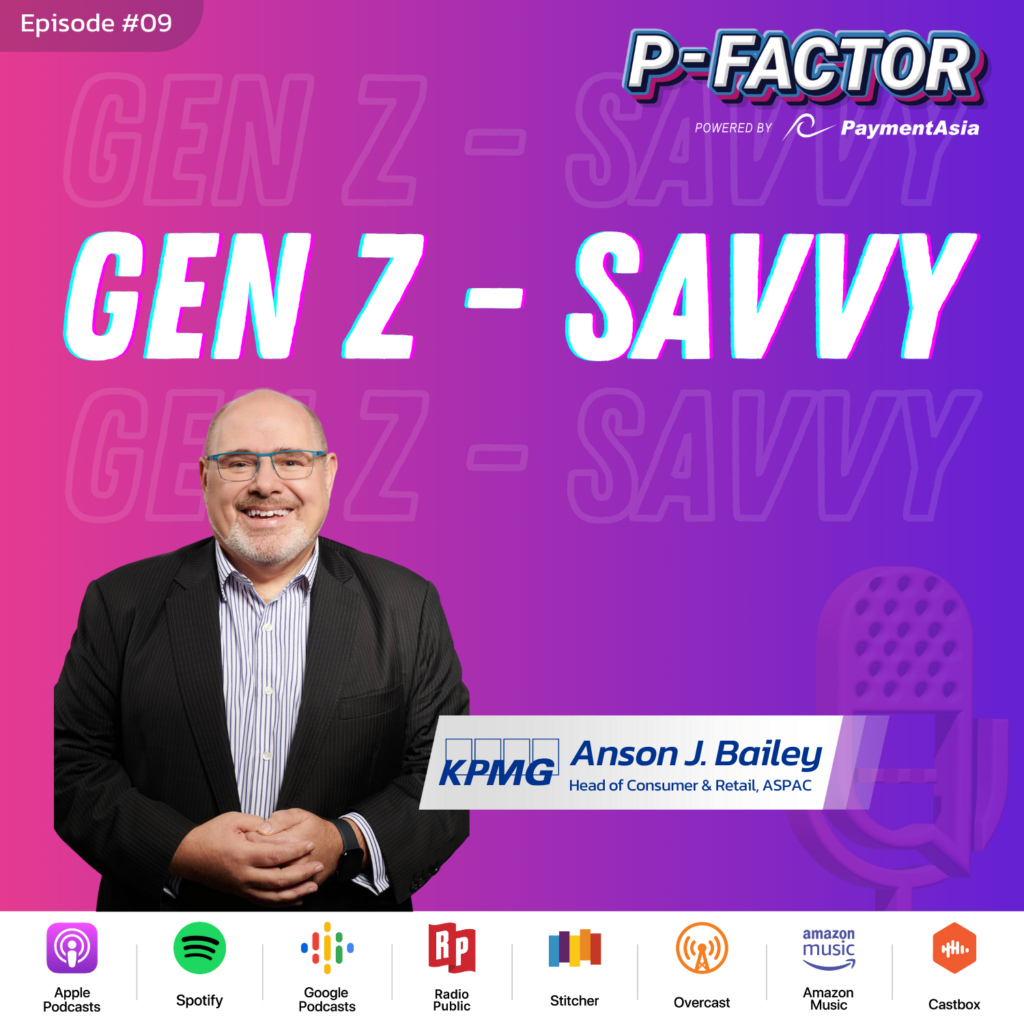Host: Welcome to the P-FACTOR. Today I’m sitting with the venerable Anson Jay Bailey from KPMG, where he heads up consumer and retail for the region for the APAC region. So very welcome to the to the show Anson.
Anson: Devere, I have to say it’s a great pleasure and privilege to be here with your amazing podcast and obviously I look forward to having a chit chat with you today.
Host: Let’s talk just generally like what brought you to Hong Kong? How long have you been living in this amazing country?
Anson: You know, it’s funny, I’ve been here for many years more years than I care to remember Devere. But yeah, I’m a 30 year veteran, I have worked around the region. But of course, one thing that kept me here was my Hong Kong wife.
Host: Beautiful, wonderful, fully integrated into the into the local system. I love it.
Anson: Fully integrated my friend. Obviously 識廣東話,沒問題 but, you know, for this podcast, we’re going to keep it in the English language,
Host: It’s best for me, my friends, I can only just about continue in English. If veer off into Cantonese, we’re gonna have real issues. All right. So you know, your remit for KPMG is retail and consumer, obviously, payment Asia. That’s, that’s our bread and butter. We mainly focus on ecommerce businesses in the sector that you’re in. So we’d be really, you know, encouraged by you to explain what you do, how you do it. And you know how the APAC region is looking at the moment and what retail markets you see thriving and how you see the market generally.
Anson: Devere, I have to say, I am quietly optimistic about the future. I know there’s a lot of people discussing about Is the glass half full? Or is it actually half empty? I’d like to think that it’s more harmful than than half empty. And why do I think that I, you know, I have to say that. And I’ve been looking at consumer retail for many years, I spent a lot of that time talking about millennial consumers. But today, I actually want to talk about those Gen Z consumers. And of course, we have teenage sons and daughters. They are the future generation that we’re going to look at. And they are incredibly tech savvy. They’re also very social media savvy. And they’re also socially aware. And if you look at China alone, Devere, we’re looking at around 300 million Gen Z consumers. But if you look at the rest of Southeast Asia, and you add South Asia at the same time, that is going to give us a universe of nearly 600 million Gen Z consumers. And that’s the reason why I’m actually quite optimistic now. Business is changing, that retail environment is constantly changing. So we can’t do the same old. And we can’t do it over and over again. We’ve got to follow those Gen Z consumers. And we’ve got to lift our game in terms of serving them in the future. But no, I’d have to say I’m actually quite positive.
Host: That’s really cool. You know, they’ve got different needs. The generation you’re talking about, as you mentioned, are very tech savvy. And you and I’ve worked in technology for a long time. And the buzz over the last 15, 20 years has been around digital transformation. I’m sure KPMG you’ve seen a lot of this. How do you look? Let’s just go back one bit into you know, sectors that you see Gen Z activity and tools maybe that you’ve seen being moved around over time for Gen Z.
Anson: Yeah. Again, I’d say there’s a lot of technology we have to be aware of. With regards to KPMG ourselves, I have to say that one of our big focus areas these days is everything around digital transformation. So I think we are going to see a lot more because we’ve got to keep up with all of those Gen Z consumers. That means we’ve got to employ the latest technologies. No longer can we just count on those old legacy ERP systems that we put in a decade ago. So the reality is, we’re seeing you know, a whole swathe of digital transformation, but from the back office, to the front office. So a lot of my clients are want to talk to us around everything around digital transformation, but they also want to talk to us about data. Because you know the new oil or the new gold, it is data The data data. And we’ve also got to recognize that, along with that digital transformation, there’s going to be a lot of data transformation. And, you know, I don’t need to tell you about everything around the cloud. But equally, we’ve seen a big uptick and everything around, you know, cyber, you know, cyber governance, cyber security, you know, these are big areas, that our clients now need to understand that we are living in this online world. And it was quite interesting, because even the traditional retailers are now you know, they’re moving more and more online. And I don’t know, if you saw a couple of days ago, the world’s biggest retailer, Walmart, you know, just announced their latest numbers. And I think if I’m not mistaken, they saw a big uptick in everything around online sales. I think it went up by about 25%. So again, that’s Walmart, but in China, you know, China, of course, happens, and everything digitally, it happens, right? You know, tomorrow is already now is already happening today. So I think this is the challenge, we’ve got that, you know, in places like China, you know, digital transformation is no longer the buzzword, that perhaps it is in the West.
Host: So interesting, you know, there’s a lot of conversation around how COVID aided digital transformation. And, you know, I worked in a cloud based business previously, and the big challenge was education, trying to educate people around the benefits of moving from offline to online. And now I think there’s much more normalcy in doing that and making that transition. You know, one of the other things that you just mentioned about data, you know, what we have seen a payment Asia, what we see generally, is that people just want a one stop shop where possible, or companies that speak to each other in an ecosystem, that works really well. So from an advisory perspective, Anson, does KPMG pull together packages? Like how do you work with small business owners that are looking to start up, you know, a company, maybe it’s online selling, or whatever they’re doing, and give them the best structure in order to deliver a digital experience?
Anson: Yeah, as I said, you know, we call we call it fields of play. So we see a lot of these fields of play now. Devaron, I already alluded to digital transformation. And that’s, as I said, from the back office, to the front office. And it’s quite interesting, isn’t it, because the big boys, I think, perhaps were benefiting from a rather uneven playing field in the past. Now, with the use of that technology, you’re now seeing a leveling up of those playing fields. So you actually see a lot of very cool entrepreneurs and startups that are also now really driving everything around e commerce and social commerce and, you know, kind of the online world. And it’s quite interesting to hear because we produce a paper, in fact, together with HSBC, titled The emerging giants in Asia Pacific, where we look at 1000s and 1000s of startups across, you know, around 14 different geographies. And last year, the key I think the key trends were all around NF T’s. It was all around the metaverse, it was around, you know, defy decentralized finance. Those were the you know, those were the big drivers. Those were the big drivers. So, you know, again, I think we’re seeing a lot of these really interesting startup players, and they’re gaining a lot of ground. They’re gaining that momentum. And above all, they’re gaining a lot of those new Gen Z consumers as well. So that’s, you know, again, that’s really interesting in terms of, it’s not just the big boys and girls, but it’s also those smaller, more agile startups that we see here in Hong Kong. We’re not just in Hong Kong, we see them across Mainland China. We see them across the whole of the Asia Pacific region. So I’m, again, I’m really excited about this startup ecosystem. Because even in Hong Kong now, we see 1000s of these new startups. And we see a big focus on fintech. And let’s face it, Hong Kong is still an international finance center. So, you know, we’re going to continue to see the emphasis on on the next generation of FinTech players. But we’re also seeing these new payment players, right? We’re seeing the new E commerce players. And again, it’s that technology that is now coming to bear. And those Gen Z consumers like our kids, that demanding it, right? They are not happy. If you know, you don’t have that technology, options, right? They want the options, and they want the convenience, right. That’s a key driver.
Host: If you can put it all in the phone, even better, right, you know, so to not feel like you have to physically go into the shop was one challenge for millennials maybe was the last generation that you had a challenge that Gen Z has got no intention of physically walking in anywhere, they don’t need to walk into it.
Anson: I’m going to tell you a funny story at KPMG. We literally serve a 1000s and 1000s of consumers all around the world. We do that, of course, across China, we do it here in Hong Kong, we do it in the Greater Bay Area. And the interesting thing is during lockdown, and don’t forget, we had the long tail of COVID. But during lockdown, we actually saw Of course, people saying, well, this is great, isn’t it, we can chill. But when we actually interviewed them, and we asked them about what do you think about the physical stores? So they were saying, Yeah, we don’t really need those physical stores anymore. But it was interesting, because they were locked down. That attitude changed in the next, then the next survey we did. And then of course, the reality was actually even those young Gen Z consumers, they wanted to have that in store experience, but they wanted a deeper, more immersive, in store experience.
Host: So extra hybrid. So your interaction, especially if you’re buying something tangible, right, you want to touch the feel of a cloth, or you want to, you know, look at the weight of the shoe or whatever it may be. But you don’t want to queue up for 20 minutes at the checkouts to get to make payment right.
Anson: And the great thing now is that that technology is here. You know, a few years ago, you and I both know it was very clunky, right didn’t really didn’t really work now, that technology is here right now. So even things like VR and AR right on VR, you now have virtual Try-on, you know, so you know, you have all of these, you know, different options, where you can try, you know, L’Oreal, you know, all of these big cosmetic players now, you know, they have these new, you know, these new businesses and technology businesses, I think, like transporter where they are collecting all of this data, and looking at what are you doing? What are you looking at, you know, what are you looking at? What are you trying on? Right? What do you need? So, you know, that information, right is getting better and better all the time. So that’s the other interesting thing, right? The data, there’s so much data out there. But also the technology is so much better.
Host: It’s interesting, right? So you’ve just used two words help? Well, you didn’t use the word human. But you’ve got a humanity piece that I touched on around going into a physical store, and being face to face with another person that people do want. And then you’ve got this data that’s generated through the purchasing, or the interactions that happen. Now, right now, I feel like the hottest thing that everybody’s talking about in technology in business generally, is AI. How do you see AI? Being a threat to humanity? And age to business?
Anson: Yeah that’s a great question. Great question. That’s right, AI is going to take away millions and millions of jobs. Now, again, it is very interesting, because I think some of the big banks have already come out recently, in the last several weeks to say that potentially what 300 million jobs will go, but the reality is, yes, jobs will go. But this is not about technology, or AI versus people versus humans. This is how we use that technology. And my view is that it’s about enabling us, right? It’s you know that if we use that technology in the right way, it’s going to enable us to get the jobs done more efficiently. So I actually think that whilst some jobs will go there’s going to be a lot more jobs. and that will be created as well. So, you know, again, we look at these new roles, don’t we? And it KPMG as well, you know, I’ve seen lots of Chief Sustainability officers recently because of ESG. But equally, how many CEOs, you know, Chief Digital Officers, have you seen? How many chief innovation officers have you seen? So there’s actually a lot and also, Chief, again, Data Officers, right, so you’re now seeing, and I’m seeing clients that have now teams of data scientists that are emerging, because they need to understand all of that customer data. And, you know, again, I think we are going to see a more hybrid, physical and digital state in the future. And the same thing around customer experience, you know, we’re going to see that, and that’s going to be a really, really, I think it’s going to be a key driver, for all of us in the future. So AI, again, I think, is very exciting. Yes, of course, there are challenges, and we need to understand, you know, how better to use that AI. But equally, it’s not people versus the machine. It’s people with the machine. And it’s us learning to work together. And it’s going to enable us to do so much more in the future. And and I think, again, the other interesting thing, you know, yes, AI and the generative AI side of things, but also IoT, now, everything is going to be connected. So IoT devices, you know, again, if you look at the reports, I think by 2025, we are going to see a world of 31 billion IoT connected devices. So we’re going to be connected at home at work, and gym, in the car, right? Well, we’re going to be connected. So that’s the reality.
Host: That’s incredible. And I’m glad you pointed out the the piece around the banks and talking about job loss, because somebody needs to build these companies and run these companies, and you mentioned on those new titles that are out there, there is going to be opportunity that’s gonna come with the development of AI, so I’m with you, and we just have to roll with it anytime a big new, the Internet was probably gonna mean the end of the world. And the remember, you know, the, the years zero are gonna happen in the strike of midnight on the year 2000. Right? It didn’t happen. So let’s keep our innovative minds open. And, you know, go with it and embrace it.
Anson: And I think, for just one moment, devic, just going back to COVID. Because one thing that COVID has done is it’s accelerated everything digitally. Right. So we were quite happy just to kind of go along with the flow. But then COVID hit, and we had to learn to be a lot more digitally minded than ever before.
Host: Ahead of transformation. Exactly.
Anson: So we’ve actually seen that speed up in the last few years, which is good.
Host: And again, it’s an example of taking something positive from a world that was really focusing on the negative. Okay, hey, let’s take one step back. Your role is Asia Pacific. Now, there are 48 countries in Asia Pacific last time I counted. I know you guys work in around 20. Of those, which countries? Do you see the most innovation? Where do you think the next hotspot is in Asia?
Anson: That’s a good question. I’ve, you know, I’ve gone on record to say that for me, China, as always been the catalyst. You know, I think in terms of that tech, that innovation, think about the early days of the startup ecosystem. We saw a lot of those big players, you know, emerge from China. But I think what happened was then then it you know, it caught on across the rest of Asia. So, you know, as I just mentioned to you that report we did emerging giants and Asia Pacific KPMG. Together with HSBC. We saw some great tech and innovation, and those thought up players in Indonesia, in Vietnam, right in Singapore, right in across the whole of Asia Pacific. So again, I go back to the fact and I do believe that were China was the catalyst for a lot of this and if you look at the, you know, the unicorns right, that’s another popular word right? You know, if we look at the unicorns, it was all about the US, wasn’t it for a number of years, you know, San Fran Silicon Valley, that’s the home of the unicorns, China, not the US off its perch. The reality was that, you know, China really drove the development of all of those unicorns. But what I’ve seen now Devere is that we’ve seen some really interesting and talented founders and entrepreneurs across the rest of Asia. Yeah. So in Indonesia, we’ve seen all of those different players, you know, we can name them the likes of Gojek. Right. Look, yeah, and look in Singapore, with Grab, right. But you go and look at that, you know, Thailand, you’ve got all of these other different players, South Korea, Japan. Right. So you know, I’m, I’m seeing it across the region, which is why I’m, you know, I’m, I’m really quite bullish about the region, there are headwinds in China, as we know. But as I said, I still believe very much that China was the catalyst. But then we’ve seen, you know, the planting of those seeds around the rest of Asia,
Host: while those alliances are there, right, there’s a dependency and there’s give and take. And I think that you mentioned earlier on about how people are sharing data. And there’s the ability to, you know, want to have one centralized ability to share knowledge between one account to another account, or one part of your business to another part of your business. That’s the same thing we’re seeing between countries and certain instances. So that stronger alliance between China and Indonesia, and Thailand and Hong Kong and whatnot, we’re if we can all work together, I sound like a bit of a kumbaya right now. But if we can all work together, then there’s no reason that Asia isn’t going to continue to be that hotbed of growth that you mentioned for unicorns, we’ve seen unicorns coming out of India, we’ve seen the unicorns come out of countries that you didn’t put down as innovation hubs, they were always the back end of the business, right, the back office, but no longer Why can’t innovation come out of the Philippines?
Anson: Absolutely. And, yeah, totally agree in terms of, you know, we’re now seeing all of these other countries across Asia, you know, jumping on that bandwagon, but also realizing that it’s about the people. And, you know, if you’ve got very talented, smart, young Gen Z entrepreneurs and founders, I think the future is very bright. And, again, you know, we there’s a lot of discussion isn’t there about the Asian century. And I, again, I think that you’ve got the likes of China, China’s not gonna go anywhere. You’ve also got India, you know, we’ve got some pretty big markets here in the region. So I’m, you know, I am excited about that. The other area that I just wanted to kind of bring up is also new geographies that are, I think, going to play a role in the future. You and I spoke a few weeks ago, well, I was over in Nairobi, in Kenya, supporting my son playing for the Hong Kong under 20s rugby team in the Rugby World trophy, where we were playing the likes of USA, and Samoa, and Kenya and Spain and lots of other countries. And that was, that was great. But actually, as you know, I stopped off in Dubai, and I caught up with my colleagues over in Dubai. And you know, Dubai is really becoming a very significant hub. And it’s, you know, going to be a big FinTech hub in the future. But I also had a visit to Riyadh. So I was in Saudi Arabia, I was over in Riyadh. And again, my, again, I was blown away by meeting a number of those, you know, young executives and entrepreneurs. And, you know, they had aspirations to equally be a major regional hub in the Middle East. And that for me was was you know, it was a, you know, a ha moment, because you hear lots of things about these places, but you’ve actually got to go there and see with your own eyes, what is going on? So as I said, I was really excited about that visit to Riyadh. I was equally excited about the fact that we are going to see this pivot it. And you know, they’re also equally really interested to see how can they link up with the startup startup ecosystem across China. And more importantly, here in Hong Kong. So, you know, they are going to be over here. There’s a delegation coming over here in mid September. Because they really want to see, you know, how they can link up with China, with Hong Kong, and how can they again, connect the dots with those startup ecosystems?
Host: Yep, that was certainly a lot of synergies. And we’ve seen it, we’ve seen the comparison of Hong Kong becoming a virtual asset hub and Dubai, being the same thing for the Middle East for the Far East and the Middle East combining to, you know, effectively unite the world across the median there. So very interesting, Anson really insightful conversation. I feel like we could absolutely do part two, unfortunately, today, this is gonna bring us towards the end of the conversation. Do you have any parting words for our wonderful P-FACTOR audience?
Anson: Again, as I said to you before, it’s all about those Gen Z consumers. And as I pointed out, there are 300 million over in mainland China, another 300 million around the region. That gives us a very significant universe. But as I said, right at the end, all right, so right at the beginning, just to kind of re emphasize, they are digitally savvy, they are social media savvy, they’re socially aware. And they’re expecting all of us, as businesses to be there with them. Right. And they want the options, but they want the convenience. And as I said, I think moving forward, because of COVID. And as we said all the terrible things that we’ve seen over COVID. But because of COVID, all of us now are a lot more digitally minded. And in fact, I guess one stat, one final stat is that, I think 95% of all consumers here in Asia Pacific. They they’re online. Yeah, every day of the week. There you go. They shop online, all the time.
Host: Gen Z, the console of the future.
Anson: It’s not just about those Gen Z, of course, focuses on the Gen Z. But it’s everybody, right? You know, even old people like you and I.
Host: We all learn from each other, right, because it normalizes the tech, and it’s high tech, but it’s actually been designed to be low friction and seamless. So we can all get on board with the with the future. So amazing answer and that’s been a really great conversation. Thank you for stopping by today and all the best with changing the world for the better.
Anson: Thank you, Devere. Great to be here on your amazing podcast and hey, we’ll have to get together but part two.
Host: Sounds like a plan. Thank you.










